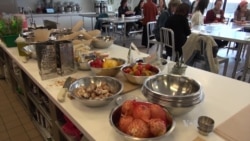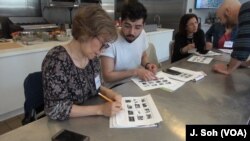Food and conversation go together like love and marriage; they are a natural pairing, one that evokes home and comfort.
That is exactly why the Free Library of Philadelphia offers cooking classes to immigrants and refugees. They learn American cooking, sure, but they also learn the English language.
The six-week course is called Edible Alphabet. On a recent Thursday, a dozen students from Iran, Taiwan, Indonesia, Brazil and France, among others, gathered in the Free Library's kitchen. This class, the last of the session, focused on pizza. While the name is Italian for pie, pizza is a ubiquitous American dish.
“We are going to measure the dry ingredients,” instructed chef Jameson O'Donnell. “Flour, salt, yeast…”
“Each week the students are learning English through a recipe,” explained Liz Fitzgerald, the Free Library's program director, “and they're learning the names of ingredients. They're learning where to buy the ingredients. They're learning how to navigate a grocery store.”
Mushrooms or peppers
Later, each participant was partnered with another whose native tongue was different from their own. Mushrooms, turkey pepperoni, green pepper … they discussed pizza toppings.
The course is taught by an English as a Second Language teacher and the chef. Yuchen Liou, the English instructor, says she listens in on the conversations and then tries to push them forward.
“For example, if they discussed what kind of topping, I can ask them, ‘What kind of topping do you like the best?' to try to push their discussion forward,” she said.
The recipes, which are mostly plant-based, are chosen as examples of American cuisine.
“For example, we choose a lesson on pancakes and use that as a springboard to talk about American breakfast tradition,” O'Donnell said.
But American cooking can be bland for foreign tastes, Fitzgerald discovered.
“Our students who are coming from the Middle East and Southeast Asia were used to a lot more flavor, and we were wondering why after every class, they would politely eat a few bites and then leave the plates largely untouched, so we decided to maybe spice it up a little bit.”
The turkey pepperoni is an attempt to add spice to the pizza. Also, a Chana Masala (spicy chickpea stew) recipe has been included in the course.
The Edible Alphabet was conceived three years ago when the Nationalities Service Center, a nonprofit organization that serves refugees, brought a group of torture survivors to the library's Culinary Literacy Center for a tour.
“Women from all over the world — many of whom didn't speak English very well or at all — and by the end of class, we were sharing pictures of our families, we were talking about our lives, communicating in any way that we could,” Fitzgerald recalled. “It was just a really beautiful moment.”
Feeling at home
After the pizza was made, the students ate it together: food and conversation.
“I like this class very much because it was fun for me and was more useful than other classes,” Iranian Parastoo Khavar said.
“We cook, we listen, learn lots of things about cooking and then we enjoy a lot here,” said Sholeh Arezounand, also from Iran. “I found some friends from everywhere in the world.”
To chef O'Donnell, the course transcends cooking and speaking English.
“I think this class gives our students the cultural literacy that they need to feel comfortable in their new home,” he said.
And they say they do feel more comfortable.
“That's been some feedback that we've gotten that after being in our class, Philadelphia seems to be a friendlier place,” Fitzgerald said. “And that to me is ... it's just beautiful.”






